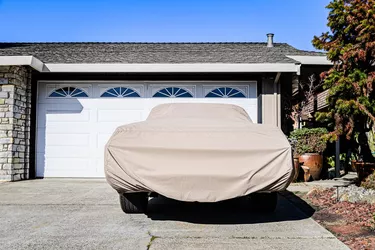
When a spouse or partner dies, you'll not only have to deal with your grief, but also a variety of legal issues that you'd rather finish sooner than later. When you want to dispose of assets, you'll follow most of the same steps, regardless of what the assets are. Reviewing the process for selling an inherited car or a decedent's vehicle that was left to a child or other heir will help you handle this situation in the most efficient way possible.
Get Your Paperwork in Order
Video of the Day
The first question you need to answer is, "Can I sell my deceased husband's car or my wife's vehicle legally?" Your spouse's assets might be controlled by a trust, will, court order, estate executor, heir or some other party. There might be no will, a probated will or a will that did not go through probate court. Find out if you own the car (or when you might legally own it) and if you have the right to sell it.
Video of the Day
If not, find out who has the authority to dispose of it. You might be able to have some input into any asset sales. For example, the executor might be willing to let you sell it to a family member, rather than advertising it or selling it to an auto dealer.
The paperwork you might need could include a will, death certificate, marriage license, probate court orders, power of attorney or other documents. Work with an attorney to make sure you are legally allowed to sell the car and if there are any limitations.
You will need to change the title on the car to yourself (or the estate executor). This is done at the state level, and you can search online for the process required in your state. For example, the state of Georgia's Gwinnett County Tax Commissioner provides step-by-step instructions for selling an inherited car.
Who Gets the Money?
You might find that you are limited as to your options for selling the car. For example, if your spouse's assets must go into a pool that is split among heirs, you won't be able to sell the car to a child for $1 or to yourself. Your spouse might also have stipulated in his or her will who gets the car.
Find out from the other parties with a claim to your spouse's assets how they want to deal with asset disposal and disbursement, then create a comprehensive plan for selling or liquidating all assets. Send them your plan for disposing of assets and distributing the proceeds to heirs. For example, an heir might want your spouse's car but is willing to pay the fair market price.
Make sure you know the tax implications of selling the vehicle for all parties involved before you sell it.
Find out how much the car is worth using a source like Kelly Blue Book, a dealer appraisal or by getting one or more offers from dealerships. If the car is a collector's item, you might need to get an appraisal from a party that specializes in selling or auctioning these types of vehicles. Find out if the car needs any repairs to get the maximum selling price. In some cases, you can sell the car as-is if the repairs won't return a much bigger selling price.
Ask Around
Once you have valued the car, ask any friends or family members who might want the car if they would like to purchase it for the appraised value. If two or more parties want the car, you might have to have an auction, with the highest bidder getting the car.
Choose Your Selling Method
When you believe you are in the legal clear to sell the car, advertise it for sale. You can post an announcement on your social media channels, use sites like Craigslist or car-selling/buying sites, take it to a car dealership or use an auction house. To get the highest value for it, make sure you have the car cleaned and detailed (unless it's a junker).